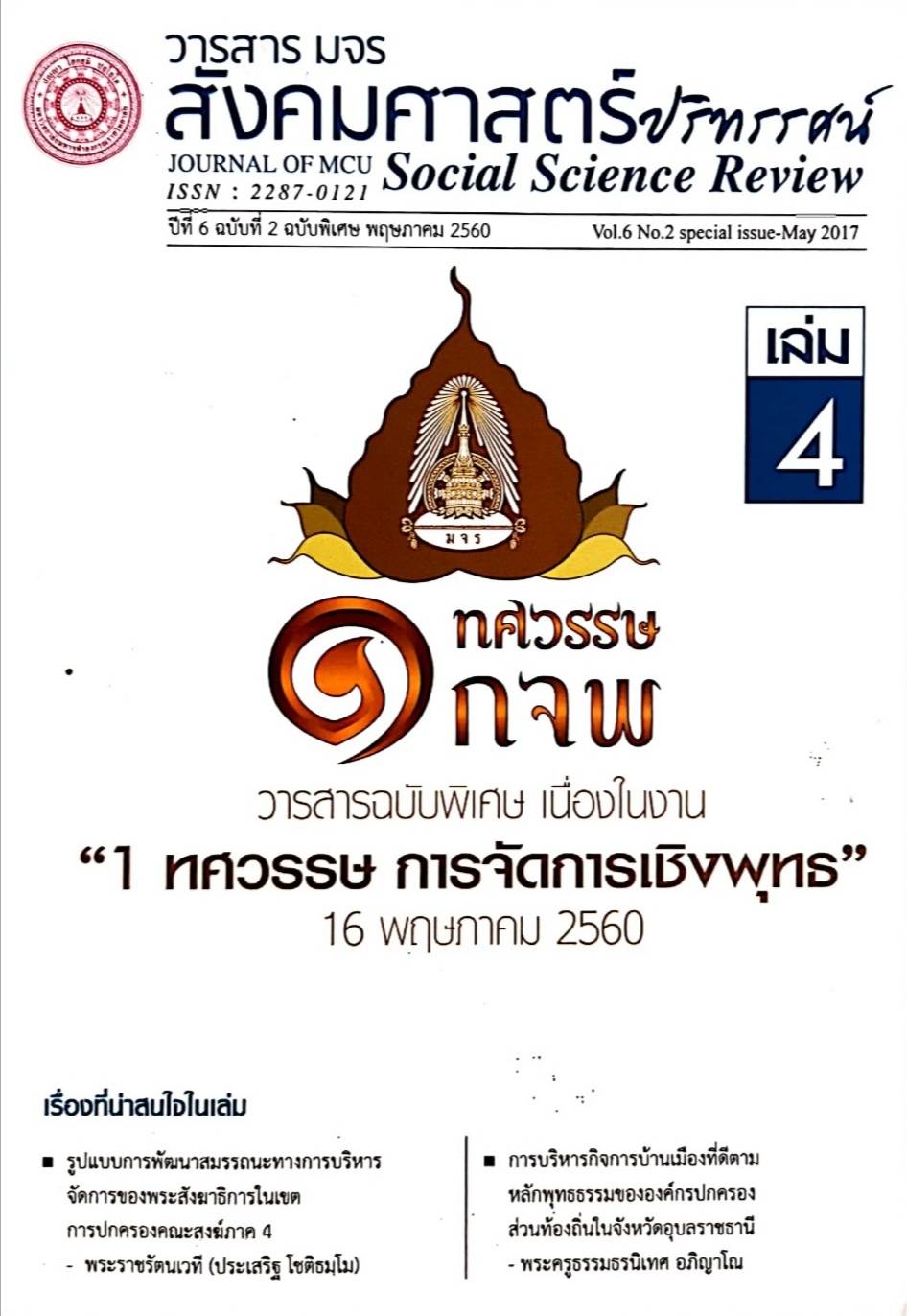การจัดการขยะมูลฝอยตามไตรสิกขาของกรุงเทพมหานคร
คำสำคัญ:
การพัฒนาทีมงานของบุคลากร, หลักพุทธธรรม, มหาวิทยาลัยมหาจุฬาลงกรณราช วิทยาลัยบทคัดย่อ
การวิจัยครั้งนี้มี (1) เพื่อศึกษาแนวคิด ทฤษฎีและหลักตามแนวพุทธที่เกี่ยวกับการจัดการ
ขยะมูลฝอยตามไตรสิกขาของกรุงเทพมหานคร (2) เพื่อศึกษาสภาพทั่วไปในการจัดการขยะมูลฝอย
ตามไตรสิกขาของกรุงเทพมหานคร และ (3) เพื่อนาเสนอการจัดการขยะมูลฝอยตามไตรสิกขาของ
กรุงเทพมหานคร
ระเบียบวิธีวิจัยเป็นการวิจัยเชิงคุณภาพ เก็บข้อมูลสองขั้นตอน ขั้นตอนที่หนึ่งจากผู้ให้
ข้อมูลหลัก 25 รูป/คน เลือกแบบเจาะจงจากผู้มีความรู้ ความเชี่ยวชาญเกี่ยวกับการจัดการ
สิ่งแวดล้อม และผู้เชี่ยวชาญเกี่ยวกับหลักพุทธธรรม ด้วยแบบสัมภาษณ์เชิงลึกแบบมีโครงสร้าง เก็บ
ข้อมูลด้วยการสัมภาษณ์แบบตัวต่อตัว ขั้นตอนที่สองเก็บข้อมูลจากผู้มีส่วนร่วมในการสนทนากลุ่ม
เฉพาะจานวน 12 รูปหรือคน เลือกแบบเจาะจงจากผู้เชี่ยวชาญ วิเคราะห์ข้อมูลจากทั้งสองขั้นตอน
ด้วยการพรรณนาความ
ผลการวิจัยพบว่า
1) แนวคิด ทฤษฎีและหลักตามแนวพุทธที่เกี่ยวกับการจัดการสิ่งแวดล้อมภายในเขต
กรุงเทพมหานคร กระบวนการจัดการตามแนวคิดของ บาร์โทล และมาร์ติน (Bartol & Martin) มา
ช่วยในการศึกษาวิจัยเพื่อนาเสนอถึงกระบวนการบริหารการพัฒนาซึ่งประกอบไป การวางแผน
(Planning) การจัดองค์การ (Organizing) การนา(Leading) และการควบคุม (Control)
2) สภาพทั่วไปในการจัดการสิ่งแวดล้อมภายในเขตกรุงเทพมหานคร ในการจัดการ
สิ่งแวดล้อมประกอบด้วย การเพิ่มประสิทธิภาพในการจัดการขยะทั่วไปและขยะอันตราย การสร้าง วินัยและการมีส่วนร่วมรับผิดชอบของประชาชนและภาคส่วนที่เกี่ยวข้องกับการจัดการขยะ การบูร
ณาการกระบวนการบริหารจัดการขยะ การเพิ่มศักยภาพในการบริหารจัดการขยะ และการวิจัยและ
พัฒนาองค์ความรู้และเทคโนโลยีในการจัดการขยะ
3) รูปแบบการจัดการขยะมูลฝอยตามไตรสิกขาของกรุงเทพมหานครมีแนวทางในการ
จัดการสิ่งแวดล้อมดังนี้
1. แนวทางการจัดการขยะมูลฝอยตามไตรสิกขาของกรุงเทพมหานคร ด้านการ
วางแผน(Planning) ตามหลักไตรกสิกขา ส่งเสริมการลดและคัดแยกขยะและใช้ประโยชน์จากขยะที่
แหล่งกาเนิด จัดให้มีการใช้มาตรการการควบคุมปริมาณขยะไม่ให้เพิ่มขึ้นสร้างจิตสานึกในการลด
ปริมาณและคัดแยกขยะและใช้ประโยชน์จากขยะที่แหล่งกาเนิด ส่งเสริมให้ประชาชนตระหนักถึง
การทิ้งและเก็บขยะมูลฝอยแยกประเภท
2. แนวทางการจัดการขยะมูลฝอยตามไตรสิกขาของกรุงเทพมหานคร ด้านการ
จัดการ(Organizing) ตามหลักไตรกสิกขา ส่งเสริมการคิดแยกขยะอันตราย ขยะอิเล็กทรอนิกส์และ
มูลฝอยออกจากขยะทั่วไป โดยการประชาสัมพันธ์ให้ประชาชนในพื้นที่ทราบกาหนดจุดทิ้ง นัดเวลา
ทิ้ง นัดเวลาเก็บขยะมูลฝอย จัดโครงการความร่วมมือกับภาคเอกชนและชุมชนในสร้างจิตสานึกการ
จัดการขยะมูลฝอย จัดโครงการความร่วมมือกับภาคเอกชนและชุมชนในสร้างจิตสานึกการจัดการ
ขยะมูลฝอย
3. แนวทางการจัดการขยะมูลฝอยตามไตรสิกขาของกรุงเทพมหานครด้านการนา
(Leading) ตามหลักไตรสิกขา ผู้บริหารสนับสนุนให้มีนโยบายการพัฒนากระบวนการเก็บขนขยะมูล
ฝอยให้มีประสิทธิภาพและเหมาะสมกับเทคโนโลยีกาจัดขยะมูลฝอย ผู้บริหารตระหนักถึงความ
ร่วมมือกับภาคเอกชนและชุมชนในการจัดการขยะมูลฝอย
4. แนวทางการจัดการขยะมูลฝอยตามไตรสิกขาของกรุงเทพมหานครด้านการ
ควบคุม(Control) ตามหลักไตรสิกขา ติดตามผลการปฏิบัติในการจัดการขยะมูลฝอยจากโครงการ
ต่างๆ ติดตามผลการดาเนินโครงการสร้างวินัย สารวจความคิดเห็นของประชาชนและหน่วยงานที่
เกี่ยวข้องเพื่อนามาบูรณาการกระบวนการบริหารจัดการขยะมูลฝอย
เอกสารอ้างอิง
: กรมควบคุมมลพิษ.
กิตติบดี ใยพูล. (2545). “เวทีแลกเปลี่ยนเรียนรู้งานวิจัยด้านกฎหมายกับการจัดการสิ่งแวดล้อม”.
รายงานสรุปผลการจัดเวทีแลกเปลี่ยนเรียนรู้งานวิจัยด้านสิ่งแวดล้อมหัวข้อ. ขอนแก่น :
มหาวิทยาลัยขอนแก่น.
เทวุษย์ บริรักษ์สันติกุล. (2552). “การมีส่วนร่วมของชาวกรุงเทพมหานครในการจัดการมูลฝอย”,
วิทยานิพนธ์ดุษฎีบัณฑิต. สาขารัฐประศาสนศาสตร์ คณะรัฐศาสตร์ : มหาวิทยาลัย
รามคาแหง.
ธเรศ ศรีสถิตย์. (2556).รวมกฎหมายและกฎกระทรวงสาหรับระบบการจัดการสิ่งแวดล้อม.
กรุงเทพมหานคร : สานักพิมพ์แห่งจุฬาลงกรณ์มหาวิทยาลัย.
บุษกร วัฒนบุตร. (2556). “การนาพุทธญาณวิทยา (ไตรสิกขา) และตัวแบบการบริหารจัดการ
ความรู้และทักษะ (KSM) เพื่อสร้างและพัฒนาทุนมนุษย์ในองค์กรมหาชน”. วิทยานิพนธ์
รัฐประศาสนศาสตรดุษฎีบัณฑิต. กรุงเทพมหานคร : หาวิทยาลัยราชภัฏวไลยอลงกรณ์
ในพระบรมราชูปถัมภ์.
ดาวน์โหลด
เผยแพร่แล้ว
รูปแบบการอ้างอิง
ฉบับ
ประเภทบทความ
สัญญาอนุญาต
ลิขสิทธิ์ (c) 2020 วารสาร มจร สังคมศาสตร์ปริทรรศน์

อนุญาตภายใต้เงื่อนไข Creative Commons Attribution-NonCommercial-NoDerivatives 4.0 International License.
เพื่อให้เป็นไปตามกฎหมายลิขสิทธิ์ ผู้นิพนธ์ทุกท่านต้องลงลายมือชื่อในแบบฟอร์มใบมอบลิขสิทธิ์บทความให้แก่วารสารฯ พร้อมกับบทความต้นฉบับที่ได้แก้ไขครั้งสุดท้าย นอกจากนี้ ผู้นิพนธ์ทุกท่านต้องยืนยันว่าบทความต้นฉบับที่ส่งมาตีพิมพ์นั้น ได้ส่งมาตีพิมพ์เฉพาะในวารสาร มจร สังคมศาสตร์ปริทรรศน์ เพียงแห่งเดียวเท่านั้น หากมีการใช้ภาพหรือตารางหรือเนื้อหาอื่นๆ ของผู้นิพนธ์อื่นที่ปรากฏในสิ่งตีพิมพ์อื่นมาแล้ว ผู้นิพนธ์ต้องขออนุญาตเจ้าของลิขสิทธิ์ก่อน พร้อมทั้งแสดงหนังสือที่ได้รับการยินยอมต่อบรรณาธิการ ก่อนที่บทความจะได้รับการตีพิมพ์ หากไม่เป็นไปตามข้อกำหนดเบื้องต้น ทางวารสารจะถอดบทความของท่านออกโดยไม่มีข้อยกเว้นใดๆ ทั้งสิ้น





